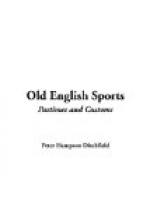“Some
merry fit
Of Mayde Marran,
or els of Robin Hood.”
In the Tudor times there were plenty of winter games for those who could play them, amongst which we may mention chess, cards, dice, shovel-board, and many others.
And when the ponds and rivers were frozen, as early as the twelfth century the merry skaters used to glide over the smooth ice. Their skates were of a very primitive construction, and consisted of the leg-bones of animals tied under their feet by means of thongs. Neither were the skaters quite equal to cutting “threes” and “eights” upon the ice; they could only push themselves along by means of a pole with an iron spike at the end. But they used to charge each other after the manner of knights in a tournament, and use their poles for spears. An old writer says that “they pushed themselves along with such speed that they seemed to fly like a bird in the air, or as darts shot out from the engines of war.” Some of the less adventurous youths were content with sliding, or driving each other forward on great pieces of ice. “Dancing with swords” was a favourite form of amusement among the young men of Northern nations, and in those parts of England where the Norsemen and Danes settled, this graceful gymnastic custom long lingered.
[Illustration: Dancing on the village green.]
The old country dances which used to delight our fathers seem to be vanishing. I have not seen for many years the village rustics “crossing hands” and going “down the middle,” and tripping merrily to the tune of a fiddle; but perhaps they do so still.
In olden days the city maidens of London were often “dancing and tripping till moonlight” in the open air; and later on we read that on holidays, after evening prayer, while the youths exercised their wasters and bucklers, the maidens, “one of them playing on a timbrel, in sight of their masters and dames, used to dance for garlands hanged athwart the streets.” Stow, the recorder of this custom, wisely adds, “which open pastimes in my youth, being now suppressed, worser practices within doors are to be feared.” In some parts of England they still trip it gaily in the moonlight. A clergyman in Gloucestershire tried to establish a cricket club in his parish, but his efforts were all in vain; the young men preferred to dance together on the village green, and the more manly diversion had no charms for them. Dancing was never absent from our ancestors’ festivities, and round the merry May-pole
“Where
the jocund swains
Dance with the maidens
to the bagpipe strains;”
or in the festal hall, adorned with evergreens and mistletoe, with tripping feet they passed the hours “till envious night commands them to be gone.”
CHAPTER II.
FEBRUARY.
“Down with rosemary
and bayes,
Down
with the mistleto,
Instead of holly,
now up-raise
The
greener box, for show.”




